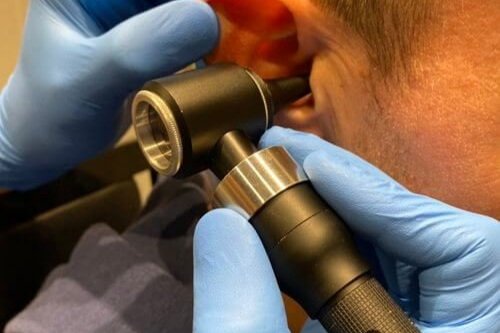Earwax & Hearing Loss - A Guide
This guide is intended for anyone experiencing hearing difficulties, such as hearing loss or deafness, due to earwax.
It provides information on the causes, symptoms, and remedies for excessive, hard, or impacted earwax.
Can Earwax cause hearing loss?
Earwax can cause hearing loss. Earwax is a natural substance produced to help protect our ears from dust, dirt, and germs. It usually falls out or washes away without intervention. However, when Earwax is overproduced, or builds up & hardens in the ear canal blocking sound waves from reaching the eardrum causing conductive hearing loss – hearing loss associated with a problem in the outer or middle ear.
How does Earwax cause hearing loss?
The ear canal’s primary function is to transmit sound waves to the eardrum, which then vibrates and sends these signals to the brain for interpretation as sound. When the ear canal is blocked it prevent the sound waves reaching the eardrum and causes hearing loss and deafness.
A blockage from earwax is known as impacted earwax and can occur from various factors; overproduction of earwax, excessive hair in the ear canal, frequent use of headphones or hearing aids, a narrow or damaged ear canal or improper cleaning – the use of cotton buds to clean the ear can push earwax deeper inside the ear canal making it harder to remove naturally.
Having hard earwax can also lead to impaction, as we age earwax becomes drier and harder, making it travel through the ear canal more slowly which can lead to a blockage.
What are the symptoms of Earwax deafness?
The symptoms of earwax deafness are hearing loss – from muffled & distorted sounds to complete deafness, a feeling of blocked ears or fullness, tinnitus (ringing or buzzing in the ear), earache, itchiness in the ear & vertigo (dizziness and sickness).
How long does hearing loss last with Earwax issues?
Deafness and hearing loss experienced due to impacted earwax will not be resolved until the blockage has been removed.
Can earwax cause deafness in both ears?
Earwax can cause deafness in the ear where the blockage is present. However, if both ears are blocked, hearing loss can occur in both.
Can Earwax issues result in permanent deafness?
Earwax issues do not cause permanent deafness when treated promptly and safely. Conductive hearing loss associated with earwax issues is highly reversible, with hearing often returning to normal immediately after treatment. However, if left untreated it can lead to complications such as ear infections or inflammation that can spread to the inner ear or brain or lead to damage of the ear drum – these problems can lead to permanent hearing loss. If you are experiencing any symptoms of earwax issues or deafness it is important to contact a specialist or professional to avoid further issues.
What’s the best way to relieve hearing loss from earwax build up?
For less severe cases of earwax build up there are some home remedies available; these involve softening the wax and dislodging the blockage.
Wax can be softened by putting 2-3 drops of olive oil in your ear. After putting in the drops of olive oil, leave for a few minutes and then tilt your head back to let the oil and earwax drain out. If you are still experiencing a blockage, you are likely to require micro suction earwax removal.
It is imperative that you do not insert any objects into your ear canal to attempt to remove the wax, in doing so you risk pushing the wax deeper into the ear canal and exacerbating the problem.
Whilst home remedies are available, the most effective way to relieve hearing loss from earwax related issues is to have it removed by a professional. Micro-suction is a safe and painless method to remove earwax. Using a microscope, small suction tube and a probe a specialist will use gentle suction to remove any excess wax or blockage within the ear.
If you are experiencing any hearing loss or earwax related issues, don’t delay in contacting a professional. Blockages rarely resolve without intervention, and you could be putting your hearing at risk.
At Ear View we offer a range of safe and effective treatments for patients seeking earwax removal in the Suffolk area, performed by experienced audiologists. See a list of our locations and services or contact us for a consultation.


